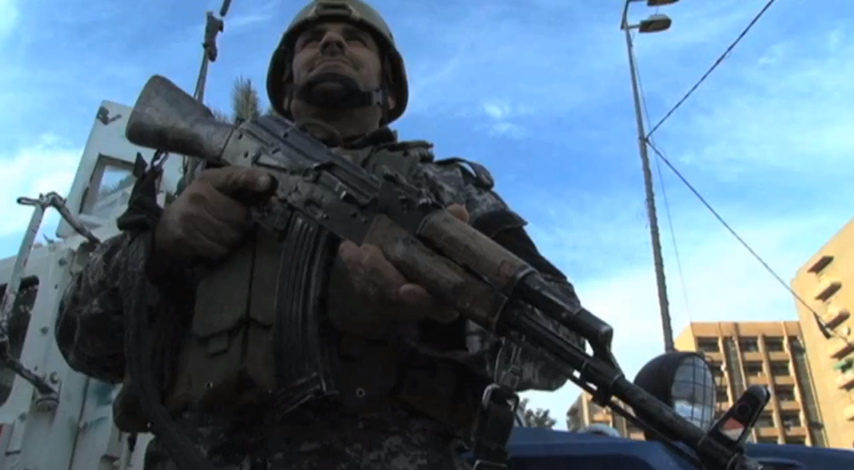The production of aesthetically and lyrically appealing media sources has quickly become a trademark of the Islamic State. Outlets such as the infamous propaganda magazine Dabiq, and the Hollywood-caliber videos are easily accessible within a few mouse clicks, and have been widely disseminated across the Internet in multiple languages. These sources have been primarily used for recruitment purposes, providing insight into ISIS’s external policies. Yet, far from the gaze of specialists and the general public, ISIS has also been distributing a series of short pamphlets throughout the streets of the Caliphate in a publication entitled ‘Maktaba al-Himma’ or ‘Library of Endeavor’.
The brochures are concise (between 2 and 8 pages), contain a single illustration (front page), and are written in an accessible Arabic. Diverging from the “glossy” and neat Dabiq, the pamphlets are an ideal medium for the propagation of information among the population: In Iraq, only 8% of the population has access to the Internet, whereas over 77% is literate. Ultimately, the most distinctive characteristic of the pamphlets remains their intent. While other media tools serve the purpose of recruitment, ISIS employs the Maktaba al-Himma pamphlets as a means to consolidate control over its adopted population through the promotion of its policies intermeshed with indoctrination techniques.
Through the pamphlets, ISIS demonstrates that it’s actively striving to offer heightened civil standing to those who are loyal to the state, and, more importantly, loyal to God. ISIS fundamentally believes that to bring dignity to the Muslim ‘Umma’ change has to come about at the root of governance: State structure. Within the modern state-system, democracy or at least the ideal of democracy has become a near universal norm. ISIS leadership adamantly breaks from this standard, referring to it as “Taghout” or idol-worship. The use of a democratic structure for proper Islamic governance is seen as a failed experiment, citing the many instances where, despite electoral success, Islamist groups have been institutionally excluded from the democratic process; as exemplified by the Islamic Salvation Front’s iconic ouster from power after having won the 1991 Algerian election. One rationale given by ISIS to explain this profound incompatibility resides in the compromising nature of democracy, or “holding the stick from the middle”. The relative tolerance encouraged by the democratic process is said to catalyze the practice of ‘heresies’ contrary to the teachings of God. Still, more importantly, democracy as a form of governance is presented as a ‘half-solution’ put forward by academics as a substitute for the teachings of God. The ISIS leadership’s proposed remedy is a return to Islam through a strict application of Sharia; instead of voting on laws devised and written by individuals, the Quran and the Hadith, among other Islamic sources are thought to provide a comprehensive and contemporarily relevant source for policy design: “what an incredible religion that has organized all matters of life”.
Nevertheless, while the source of legislature is clear, the structure of the decision-making process remains opaque. The various pamphlets often use ‘Islamic State’ and ‘Allah’ interchangeably, feeding the claim that policies put forth by ISIS are applications of ‘divine decrees’. This myth supports the bid for the Caliphate as the legitimate governing body of the Islamic State lead by Caliph Abu Bakr al-Qurashi al-Huseini al-Baghdadi, the “Warrior Sheikh”, the “Ascetic Worshipper”, “Leader of the faithful”, and “Commander of the Mujahideen”. To seemingly increase Baghdadi’s popularity among the masses, ISIS even started a campaign, distributing pamphlets entitled: “Extend your Hands in Allegiance to Baghdadi”. In them, a resume of Baghdadi’s qualifications and successes are meant to familiarize ‘subjects’ with their new leader, it includes: A summary of his academic path, his extensive experience in the struggle for Jihad including a list of his victories and successes as a leader and as a warrior, and, of course, his ancestral link with the prophet Muhammad through his daughter Fatimah. The ‘subject’ is left with a plea to pledge allegiance to Baghdadi as an act of loyalty to the Muslim Umma, and an act of defiance to the infidels who threaten the state. Beside the Caliph, little is known about the ISIS decisional hierarchy or the process through which positions of power are allocated.
Beyond the structure of the state, the bulk of the pamphlets are designed to inform the ‘subjects’ of their rights and duties. Through this medium, ISIS appears to be gradually building a distinct identity; clearly defining who is part of the ‘Umma’, and who is alien to the polity. In a pamphlet entitled “There is no God but Allah- Loyalty and Enmity”, the Islamic State puts forth a strict dichotomy of us vs. them: if a ‘subject’ is a believer “inside and out” and “refuses democracy”, the state will be loyal and “offer the rights of Islam” regardless of where the ‘subject’ might come from. As such, the place of non-Sunni Muslim faithfuls within the new society is a recurring topic. Regarding the Alawite and Druze minorities, a pamphlet states: “Our duty is to kill them and purify the earth from their existence”. They’re considered ‘heretics’, ‘apostates’, ‘Magi’, ‘more sinful than Jews and Christians’ who must not mix in any way with the general population. The solution is absolute: Either conversion or death.
To strengthen their rhetoric, the pamphlets often use a loaded geopolitical narrative that bolsters ISIS’ image to the detriment of the “nations of the devil”. ISIS paints itself as the protagonist of one of the greatest events in history: the return of the Caliphate. One pamphlet even draws extensive analogies between the prophet Muhammad’s epic watershed episode in the Arabian Peninsula and the Islamic State’s accomplishments on “the sacred earth of the Levant”. The pamphlets proclaim the superiority of the Arabo-Muslim civilization, stressing its belief in its vulnerability in the face of this “other” that has pledged the annihilation of the Umma. Jihad is presented as a duty against the ‘crusaders and their allies’ responsible for causing the “tragedy of the Umma”. Every opponent is seen as the last obstacle separating the good Muslim from his creator in paradise. Gradually, the feelings of fear evolve, eventually turning into rage and hatred. ISIS attempts to convince its ‘subjects’ that it sympathizes with their suffering and that they are deserving of rights; rights that can only be guaranteed if the “we” survives.
The Islamic Sate appears to be playing the long game: In order to create a viable ‘state’, they realize the need to evolve beyond their primordial militia stage. As such, they are actively attempting to expand their circle by soliciting the support of the local populations. Beyond their military presence, the ‘Maktaba al-Himma’ pamphlets have become an auxiliary tool meant to control and organize the population. The policies promoted create a sense of responsibility and sympathy of ISIS towards its adopted population. Collectively, the pamphlets form a rudimentary constitution of sorts meant to foster an identity and a polity.




